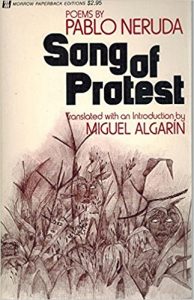For our last Theme Thursday event highlighting Hispanic Heritage month, we consider the authors and poets who gave voice to people experiencing the political, cultural, and financial turmoil made real by the revolutions of their time.
Pablo Neruda was an important Chilean poet and politician. In the years following Neruda’s service as consular in Mexico, he developed his artist voice. During his service Neruda became immersed in the philosophy, goals, and consequences of the Mexican revolution and was well acquainted with muralismo and its proponents. His early works were mostly love poems, but as he matured and gained life experience he began to write and think more politically. His poetry gave a voice to a population that felt ignored by their government and by the upper classes. The poems gave courage and pride to the struggling working class. Chilean workers memorized his works by heart and gathered to hear their poet recite his writing.
 Song of Protest by Pablo Neruda, translated and with an introduced by Miguel Algarín
Song of Protest by Pablo Neruda, translated and with an introduced by Miguel Algarín
The essential Neruda: Selected poems, edited by Mark Eisner; translated by Mark Eisner
Affectionately known as “Gabo,” Colombian novelist, screenwriter and journalist, Gabriel Garcia Marquez was one of Latin America’s most iconic figures of modern literature. In 1982, he was awarded the Nobel Prize for Literature for his collective work “in which the fantastic and the realistic are combined in a richly composed world of imagination, reflecting a continent’s life and conflicts.” Forever inquisitive, critical and creative, Garcia Marquez was not only a key figure of literature in the region, but was an important figure in leftist politics. Garcia Marquez’s story is heavily linked to Cuba, its socialist revolution and the late leader Fidel Castro. Known as a prolific reader, Fidel was known to read and correct Garcia Marquez’s manuscripts before they were sent to be published.
While Garcia Marquez drew inspiration from Cuba’s revolution in his writing, the pair did not always agree. At times the novelist was critical of Fidel’s views, in particular surrounding the Cold War and his support for the Soviet Union.
Love in the time of cholera by Gabriel García Márquez; translated from the Spanish by Edith Grossman
La aventura de Miguel Littín clandestino en Chile by Gabriel García Márquez
The House of Spirits was Isabel Allende’s debut novel. The story details the life of the Trueba family, spanning four generations, and tracing the post-colonial social and political upheavals of Chile – though the country’s name, and the names of figures closely paralleling historical ones, such as “the President” or “the Poet”, are never explicitly given. The story is told mainly from the perspective of two protagonists (Esteban and Alba) and incorporates elements of magical realism. Read this and other publications of hers, available from the library.
 Afrodita: Cuentos, recetas y otros afrodisíacos por Isabel Allende ; ilustraciones, Robert Shekter ; recetas, Panchita Llona
Afrodita: Cuentos, recetas y otros afrodisíacos por Isabel Allende ; ilustraciones, Robert Shekter ; recetas, Panchita Llona
Eva Luna by Isabel Allende ; translated from the Spanish by Margaret Sayers Peden
Aphrodite: A memoir of the senses by Isabel Allende ; drawings, Robert Shekter ; recipes, Panchita Llona ; translated from the Spanish by Margaret Sayers Peden
Want to read other Latin American authors who were influenced by revolutions? Check out some of these authors.
